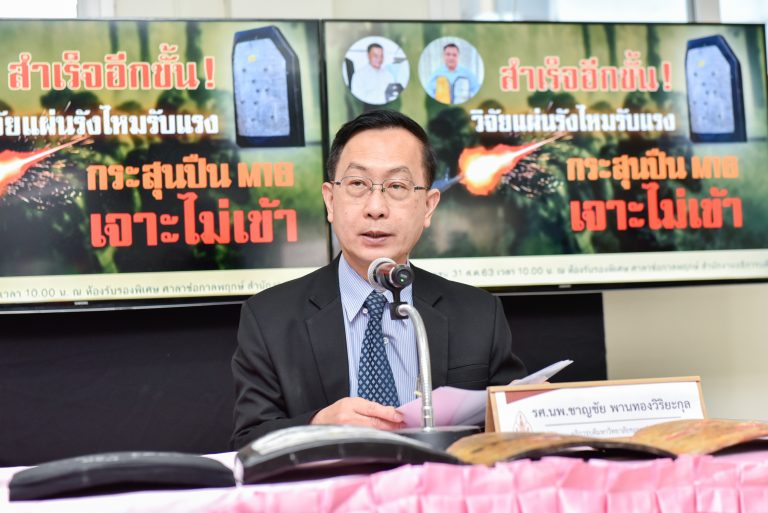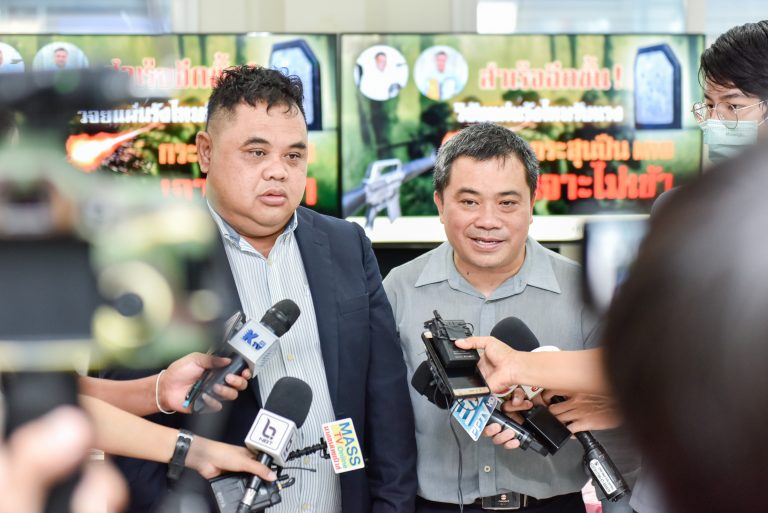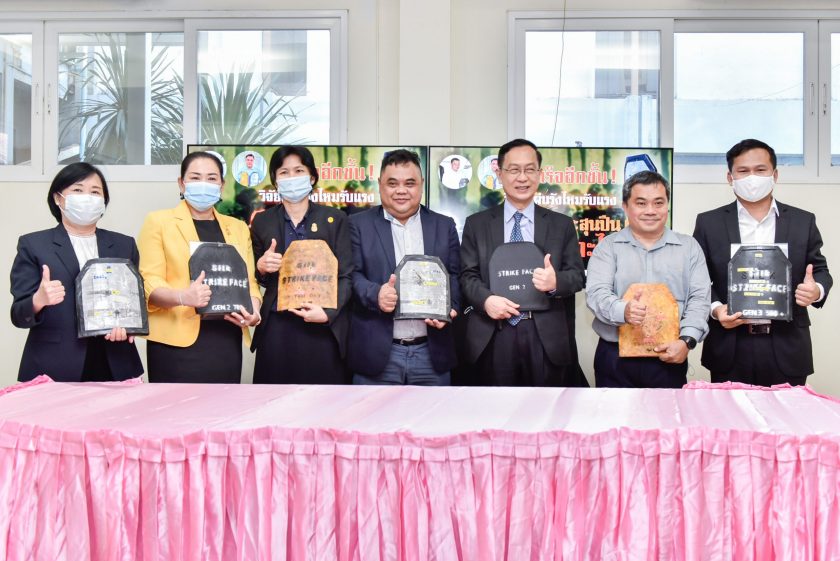Monday August 31, 2020, 10:30 a.m. – 12:00 p.m. at the VIP Room, Cho Kalaphruek Pavilion, Office of the President, Khon Kaen University – Communications Division of KKU met the press to release news on “Research on Cocoon that Receive Impact on M16” – a study on the cocoon sheet that formerly protected against short-gun bullets, but no succeeding in receiving impact from 5.56mm, and M16 used in military. Assoc. Prof. Charnchai Panthongviriyakul, M.D., President of KKU presided over the press release, Asst. Prof. Dr. Panomkorn Phwakhong from Department of Chemical Engineering and Ajarn Sutha Loi-duanchai, a researcher joined in the news releasing. A lot of media reporters attended with interest.

Assoc. Prof. Charnchai Panthongviriyakul said, “Asst. Prof. Dr. Panomkorn Phwakhong from Department of Chemical Engineering and Ajarn Sutha Loi-duanchai have conducted a study that is extended from the former successful research on cocoon sheet that could receive short-gun bullets like 9mm or 11mm. This research is on production of a cocoon sheet that can receive impact from bigger guns. The study has already been registered as an intellectual university property.”
“What is outstanding of this research, when compared to a 9mm metal sheet used as lining in general flak vests, is that it is 2-3 times lighter. Another point is it can stop the bullet and prevent it from ricocheting. When the sheet is metal, ricocheting may result in the bullet impacting other areas of the body or any person nearby who will get injured. The research team has developed several sheets from cocoon to get impact from different sizes and types of bullets. The sheets are also light and can be selected for specific purposes of jobs. If interested, one can consult the researchers,” Assoc. Prof. Charnchai Panthongviriyakul ended.
Asst. Prof. Dr. Panomkorn Phwakhong disclosed, “Formerly, the research on bullet-impact cocoon sheet was for the purpose of receiving impact from short guns. Now we have come up with the sheets against 5.56mm and the military used M16. This means we are now able to operate under the higher-level army conditions. There are two types, the 2 kg and 1.6 kg, which are 2-3 times lighter than the 9mm metal sheet used in lining common flak vests.”
For the production process of the cocoon sheet against 5.56 mm bullet, Asst. Prof. Dr. Panomkorn Phwakhong explained, “Producing this is different from the sheet for short-gun bullets. But we still use flexible cocoon that is light and receives impact well. We add another material for distributing load and use special kind of solution so that the materials would adhere to one another efficiently, resulting in an M16 proof cocoon sheet different from the former ones. Even though 4 of the former sheets are put layer on layer, a 5.56 mm bullet can still penetrate. The new one does better in this respect, so it has been registered as an intellectual property.”
Ajarn Sutha Loi-duanchai, the researcher said, “The property of this cocoon sheet is that it stops the bullet from ricocheting. If we compare it against the flak vest made from Kevlar, we see that the cocoon sheet is cheaper and can protect against sharp arms such as knives, which cannot break past the cocoon sheet. Now we have two types: the 3 models of the short-gun sheet, 0.9 kg, 0.75 kg, and 0.55 kg; and the sheet for 5.56mm bullets comprising 2 models: 2 kg, and 1.6 kg for suitable choices of operations of soldiers, police, or frontier police in the southern risk areas.”
At the press release, demonstrations were offered at the shooting gallery using the 5.56mm guns for the 2 kg and 1.6 kg cocoon sheets. With the 2 kg sheet, the bullet stuck inside but not getting through the sheet, even though the vest protruded a little at the back. With the 1.6 kg, the bullet was found at the front part, the back protruded and broke, but the bullet was still inside. This proved the success of the two sheets.
This shows the effectiveness of Khon Kaen University’s research works that does not remain unused. The outcomes are useful for the country. Anyone interested in the products can ask for more details from Asst. Prof. Dr. Panomkorn Phwakhong or Ajarn Sutha Loi-duanchai at Department of Chemical Engineering, Faculty of Engineering, Tel. 089 840 6586.
[ Thai ]
News: Wachara Noichompoo
Photos: Boriphat Thasi.







